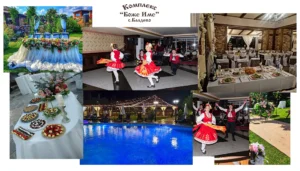 Weddings are joyous occasions that celebrate love, unity, and the merging of two families. Greece and Bulgaria, two nations with rich cultural heritages, have distinct wedding traditions that reflect their unique histories and customs. As part of the Interreg Greece-Bulgaria program, two companies in the hospitality industry came together to delve into the enchanting world of Greek and Bulgarian wedding traditions. In this blog post, we will embark on a delightful journey, exploring the captivating similarities and differences in wedding customs between these two remarkable countries.
Weddings are joyous occasions that celebrate love, unity, and the merging of two families. Greece and Bulgaria, two nations with rich cultural heritages, have distinct wedding traditions that reflect their unique histories and customs. As part of the Interreg Greece-Bulgaria program, two companies in the hospitality industry came together to delve into the enchanting world of Greek and Bulgarian wedding traditions. In this blog post, we will embark on a delightful journey, exploring the captivating similarities and differences in wedding customs between these two remarkable countries.Meeting at the Bulgarian Company’s Location:
The meeting took place at the captivating location of the Bulgarian company, providing a beautiful backdrop that echoed the essence of Bulgarian wedding traditions. Representatives from the Greek and Bulgarian companies gathered to exchange insights, present their respective wedding customs, and engage in a vibrant discussion about the rich tapestry of matrimonial celebrations in their countries.
Greek Wedding Traditions: Embracing Heritage and Celebrating Love:
Greek weddings are imbued with cultural significance, rooted in ancient traditions that have been passed down through generations. The Greek representatives shared captivating stories of the elaborate customs that surround Greek weddings, symbolizing the union of two individuals and their families.
One iconic Greek wedding tradition is the “koufeta” or sugar-coated almonds, which are given to guests as favors, representing the bittersweet moments of life. The Greek company emphasized the importance of the “stefana” or wedding crowns, which are intertwined with ribbons and placed on the couple’s heads, symbolizing their unity and commitment.
Greek weddings are also known for their lively music and traditional dances, such as the “Kalamatianos” and “Zorba’s dance,” which bring guests together in exuberant celebration. The breaking of plates, a joyful custom called “smashing the plates,” adds a festive touch to the festivities, symbolizing the couple’s readiness to face any challenges together.
Bulgarian Wedding Traditions: A Fusion of Folklore and Symbolism:
Bulgarian wedding traditions are a reflection of the country’s deep-rooted folklore and symbolic rituals. The Bulgarian company shared fascinating insights into the customs that make Bulgarian weddings truly unique and unforgettable experiences.
One notable Bulgarian tradition is the exchange of wedding bread, known as “pitka.” The bread is shared between the couple, symbolizing their commitment to provide for each other and their future family. Another cherished custom is the “stealing of the bride,” where the groom and his friends must negotiate with the bride’s family to win her hand in marriage.
In Bulgaria, traditional folk dances, such as the “horo,” play a central role in wedding celebrations. Guests join hands and form a circle, dancing joyously to lively music, creating a sense of unity and merriment. Additionally, traditional Bulgarian attire, with its vibrant colors and intricate embroidery, adds a touch of cultural splendor to the wedding festivities.
Discovering Common Threads:
During their meeting, the Greek and Bulgarian representatives were thrilled to uncover common threads woven through their wedding traditions. Both cultures place great importance on celebrating love, family, and unity. The act of breaking bread, sharing food, and dancing together emerged as shared elements that signify the joyous union of two families. Furthermore, the presence of vibrant music and dances demonstrated the universal desire to celebrate and rejoice in love’s triumph.
The meeting between the Greek and Bulgarian companies under the Interreg Greece-Bulgaria program provided a fascinating exploration of wedding traditions in these two enchanting countries.
